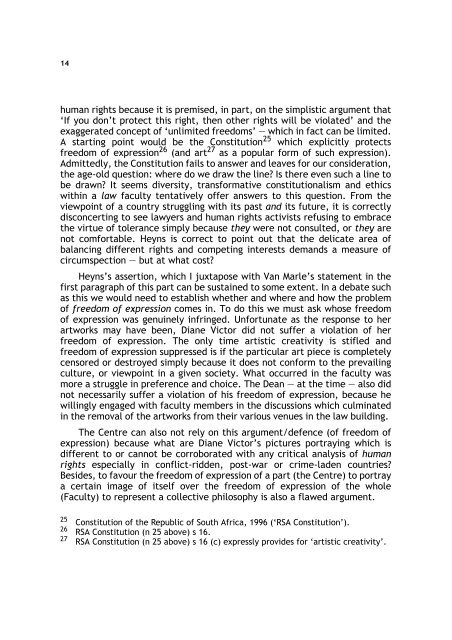Download this publication - PULP - University of Pretoria
Download this publication - PULP - University of Pretoria
Download this publication - PULP - University of Pretoria
You also want an ePaper? Increase the reach of your titles
YUMPU automatically turns print PDFs into web optimized ePapers that Google loves.
14<br />
human rights because it is premised, in part, on the simplistic argument that<br />
‘If you don’t protect <strong>this</strong> right, then other rights will be violated’ and the<br />
exaggerated concept <strong>of</strong> ‘unlimited freedoms’ — which in fact can be limited.<br />
A starting point would be the Constitution25 which explicitly protects<br />
freedom <strong>of</strong> expression 26 (and art 27 as a popular form <strong>of</strong> such expression).<br />
Admittedly, the Constitution fails to answer and leaves for our consideration,<br />
the age-old question: where do we draw the line? Is there even such a line to<br />
be drawn? It seems diversity, transformative constitutionalism and ethics<br />
within a law faculty tentatively <strong>of</strong>fer answers to <strong>this</strong> question. From the<br />
viewpoint <strong>of</strong> a country struggling with its past and its future, it is correctly<br />
disconcerting to see lawyers and human rights activists refusing to embrace<br />
the virtue <strong>of</strong> tolerance simply because they were not consulted, or they are<br />
not comfortable. Heyns is correct to point out that the delicate area <strong>of</strong><br />
balancing different rights and competing interests demands a measure <strong>of</strong><br />
circumspection — but at what cost?<br />
Heyns’s assertion, which I juxtapose with Van Marle’s statement in the<br />
first paragraph <strong>of</strong> <strong>this</strong> part can be sustained to some extent. In a debate such<br />
as <strong>this</strong> we would need to establish whether and where and how the problem<br />
<strong>of</strong> freedom <strong>of</strong> expression comes in. To do <strong>this</strong> we must ask whose freedom<br />
<strong>of</strong> expression was genuinely infringed. Unfortunate as the response to her<br />
artworks may have been, Diane Victor did not suffer a violation <strong>of</strong> her<br />
freedom <strong>of</strong> expression. The only time artistic creativity is stifled and<br />
freedom <strong>of</strong> expression suppressed is if the particular art piece is completely<br />
censored or destroyed simply because it does not conform to the prevailing<br />
culture, or viewpoint in a given society. What occurred in the faculty was<br />
more a struggle in preference and choice. The Dean — at the time — also did<br />
not necessarily suffer a violation <strong>of</strong> his freedom <strong>of</strong> expression, because he<br />
willingly engaged with faculty members in the discussions which culminated<br />
in the removal <strong>of</strong> the artworks from their various venues in the law building.<br />
The Centre can also not rely on <strong>this</strong> argument/defence (<strong>of</strong> freedom <strong>of</strong><br />
expression) because what are Diane Victor’s pictures portraying which is<br />
different to or cannot be corroborated with any critical analysis <strong>of</strong> human<br />
rights especially in conflict-ridden, post-war or crime-laden countries?<br />
Besides, to favour the freedom <strong>of</strong> expression <strong>of</strong> a part (the Centre) to portray<br />
a certain image <strong>of</strong> itself over the freedom <strong>of</strong> expression <strong>of</strong> the whole<br />
(Faculty) to represent a collective philosophy is also a flawed argument.<br />
25 Constitution <strong>of</strong> the Republic <strong>of</strong> South Africa, 1996 (‘RSA Constitution’).<br />
26 RSA Constitution (n 25 above) s 16.<br />
27 RSA Constitution (n 25 above) s 16 (c) expressly provides for ‘artistic creativity’.

















